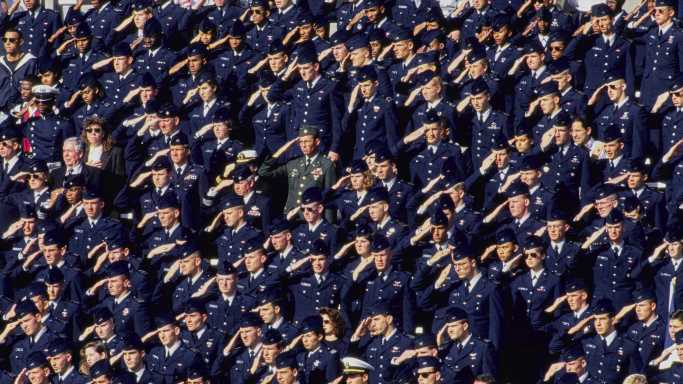The Size of the American Military Every Year Since the Korean War
The changing size of the U.S. military is a reflection of changing geopolitical conditions, budgetary concerns, and recruitment challenges. A combination of these factors has led to a decades-long downsizing of active-duty personnel.
The status of the United States as a global military superpower has remained unchanged since the end of World War II. The size of the U.S. military, however, has changed significantly over the years. Since the mid-1950s, the number of active-duty men and women serving in the Army, Navy, Air Force, and Marine Corps has fluctuated from as many as 3.5 million to as few as 1.1 million. (These are the largest U.S. Military bases.)
Using data from the Department of Defense, 24/7 Wall St. identified the size of the U.S. military every year since 1954.
The number of troops in the U.S. military topped 3 million in only six of the last 69 years on the list. At the end of the Korean War in 1954, there were 3.3 million active duty service members. This number dropped by 11% the following year and continued to fall for the next half decade. Troop levels did not top 3 million again until the escalation of the Vietnam War in 1966 – and they have not topped 2 million since the end of the Cold War. (Here is a look at history’s largest armies.)
Just as major military engagements expanded the ranks of the U.S. military, the end of those conflicts saw a reduction in active-duty military personnel.
More recently, the size of the military has been influenced by factors related to budget, technological advancement. As military technology has advanced, so too have costs. In the early 1940s, it cost about $2,600 to equip an Army rifleman, adjusting for inflation. By 2012, those costs ballooned to $20,000 and have only gone up since. According to the DoD, the more advanced – and expensive – equipment has offset troop reduction and maintained combat capabilities. (Here is a look at what the U.S. spent on the military every year.)
Currently, the size of the U.S. military is at a multi-decade low – and that is not entirely by design. All branches of the armed services are reporting steep shortfalls in enlistment as a strong job market has made military service a less appealing option. Meanwhile, the new generation of Americans are less willing to consider a military career than previous generations, and less than one-quarter of young Americans are physically fit enough to enlist. These challenges are leaving critical jobs in the military unfilled.
Click here to see the size of the US military each year since the Korean War.
Sponsored: Tips for Investing
A financial advisor can help you understand the advantages and disadvantages of investment properties. Finding a qualified financial advisor doesn’t have to be hard. SmartAsset’s free tool matches you with up to three financial advisors who serve your area, and you can interview your advisor matches at no cost to decide which one is right for you. If you’re ready to find an advisor who can help you achieve your financial goals, get started now.
Investing in real estate can diversify your portfolio. But expanding your horizons may add additional costs. If you’re an investor looking to minimize expenses, consider checking out online brokerages. They often offer low investment fees, helping you maximize your profit.
Source: Read Full Article

